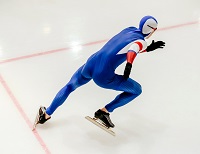Personalised nutrition as a driver of sports success
Vitamin tests can examine whether beginner or expert athletes have a vitamin deficiency based on blood-test results. However, even if the test results show a deficiency, you still have to identify its cause. Is it simply a dietary issue or is it something else? And if it does turn out to be a problem with your diet, can the doctor who diagnoses you provide the best advice? After all, many doctors know a lot about illnesses and preventive medicine, but they are not sports dieticians.
For this reason, nutrition researchers at Wageningen University & Research (WUR) have joined forces with Gelderland Valley Hospital (GVH) in Ede to form the Healthcare Nutrition Alliance (in Dutch). Together, they have developed a system that links the levels of folic acid and vitamin B6, B12 and D to the patient’s dietary habits for everyone from regular people to professional athletes. The name of the system is NutriProfiel. As well as providing a blood sample, you must fill in the Eetscore (Food Score) questionnaire, which was specially developed by WUR and has been scientifically proven effective. It allows comparison of blood-test results with the subject’s diet.
“The comparison of nutritional intake with blood-test results makes NutriProfiel unique.”
Vitamin deficiencies
Michiel Balvers, who works as a research associate for both WUR and GVH, explained the added value of the system. ‘Imagine your blood tests identify a vitamin deficiency, yet examination of your diet suggests there shouldn’t be a deficiency. In such cases, something else might be wrong, for example, intestinal problems that prevent your body from absorbing vitamins properly. This extra information about the deficiency can provide valuable extra information for both sports doctors and regular doctors in determining the right course of subsequent action. Deficiencies can also be caused by insufficient levels of nutrients in your diet, in which case you should investigate why this is so.’
In addition to analysis, the research team also provides personal nutritional advice: what can this consumer/athlete do to resolve the vitamin deficiency and to prevent it from recurring in the future? ‘In some cases, a temporary course of vitamin supplements may be required to resolve the deficiency,’ says Balvers. ‘However, in the long run, healthy nutrition is the main factor.’ The nutritional advice complies with the guidelines for healthy nutrition.
Where to do the test
GPs, sports doctors (in Dutch) and other healthcare professionals benefit greatly from NutriProfiel, as it allows them to easily give personalised nutritional advice. The test results can also be automatically saved in the electronic patient file. Vitamin tests with NutriProfiel do not involve any extra costs, just the regular cost of a blood test. You can also request a test yourself (in Dutch), without seeing a doctor and pay for it yourself.
Healthy choice for athletes
NutriProfiel can help athletes to make the right choices. Researchers from WUR and GVH are currently optimising the questionnaire about eating habits in order to specifically cater to athletes’ needs as well as give advice to regular consumers. Snacks popular among athletes, such as fruit and yoghurt, are now being added to the questionnaire. The extra questions give insight into aspects such as the production of red blood cells, in which B vitamins play a key role. The most important function of red blood cells is the absorption of oxygen in the lungs, providing your muscles and organs with the vital oxygen they need. Chronic vitamin D deficiencies increase the likelihood of broken bones in the long term.
Vitamin overdoses
Sometimes, blood tests discover excessive levels of vitamins or even overdoses. ‘At our hospital, we see a couple of cases of excessive vitamin B6 per year,’ explains Balvers. ‘It’s not always intentional: sometimes supplements contain a higher dose of vitamins than is stated on the label. Excessive levels of B6 can result in neurological damage.’ In 2014, the Dutch Consumer Association published a study (in Dutch) of the differences between measured quantities and the quantities stated on the labels.

 The programme
The programme 
Wonderful site you have here but I was wanting to know if you knew of any forums that cover the same
topics discussed here? I’d really like to be a part of community where I can get responses
from other knowledgeable individuals that share the same interest.
If you have any suggestions, please let me know.
Cheers! teva generic viagra